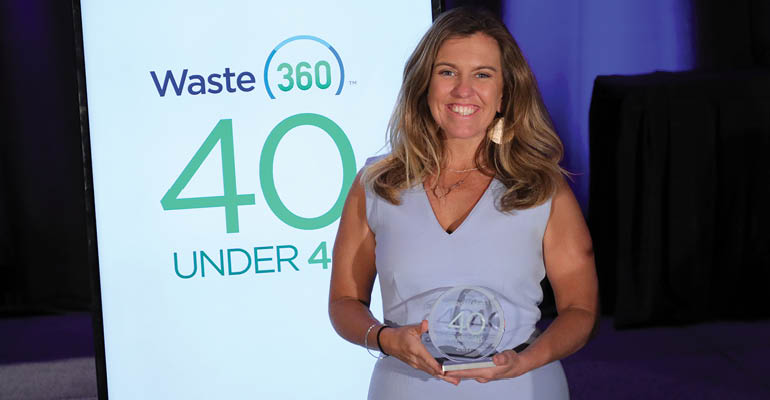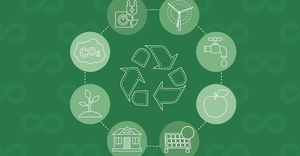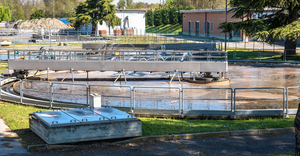We recently spoke with the Waste360 40 Under 40 award recipient about the details of Oceanside’s Zero Waste Strategic Plan and her advice for up-and-coming industry workers.

It’s no surprise that Colleen Foster, senior solid waste and recycling management analyst for the city of Oceanside, Calif.’s water utilities department, landed a career in the waste and recycling industry because she has always known that she wanted to work in a field where she could make a difference.
Since joining the industry 10 years ago, Foster has helped develop and implement a number of waste reduction initiatives, including helping the Oceanside School District become one of the first zero waste districts in the nation and assisting in creating the Oceanside Zero Waste Strategic Plan that set a community goal of a recycling rate of 75 percent to 95 percent.
In addition to her role with Oceanside, Foster is a Solid Waste Association of North America (SWANA) Young Professional and this year’s vice president and co-chair of the California Resource and Recovery Association (CRRA).
“As a recipient of the 2016 Waste360 40 Under 40 award, I can personally tell you that Colleen Foster was born for this award,” says Josh Allen, CEO of Global Disposal Reduction Services, Inc. “It is rare to find someone who is so driven and creative in the waste and recycling industry, and as the senior solid waste and recycling management analyst for the city of Oceanside, Colleen fights to maximize the city’s budget and push the limits on what the city can achieve on a daily basis.”
We recently spoke with the Waste360 40 Under 40 award recipient about her duties as senior solid waste and recycling management analyst, the details of Oceanside’s Zero Waste Strategic Plan that she helped develop and implement and her advice for up-and-coming industry workers.
Waste360: How did you begin your career in the waste and recycling industry?
Colleen Foster: In some ways, I feel like I was destined to be in the industry. And in other ways, I fell into it. Many people don’t go into college dreaming of talking trash one day, but I am one of those people who went to school seeking a career in public services and a place where I could make a difference. Fortunately for me, I was able to find that with the city of Oceanside.
I attended the University of California, Davis, and earned my bachelor’s degree in international relations with a focus on third-world development and agricultural sustainability in Latin America. After graduating, I worked for the city of South Pasadena, Calif., for almost three years, and then I took a records analyst role with the city of Oceanside that was more in line with my personal sustainability goals.
In that role, I was assigned to a solid waste and recycling program that the city really hadn’t established or developed yet. And over the years, I have put my energy and heart into that program to help build it up into a sustainable and innovative program for our communities.
Around the same time that I was helping to build up the new program for the city, I went back to school at Vermont Law School and earned my master’s degree in environmental law and policy with a focus on climate change mitigation and adaption.
Over time, I have realized that my education and work experience really do go hand-in-hand and that I want to continue working with communities to help them be more supportive of the environment.
Waste360: Tell us about some of your duties as senior solid waste and recycling management analyst.
Colleen Foster: My role is very dynamic, but I basically manage the city’s solid waste and recycling program. I am the city’s contract administrator for its franchise agreement with Waste Management, I oversee the city’s sustainability campaign called the Green Oceanside campaign and I am responsible for the implementation of the city’s zero waste plan. Additionally, I deal with everything in regards to education, outreach, regulatory requirements, reporting, strategic planning, contract administration and budgeting.
The solid waste and recycling program was actually in our public works department up until five years ago, when we transitioned the program over to the water department. Since that transition, I have been able to incorporate the city’s sustainability goals for water conservation, energy and clean water with the city’s zero waste goals. In addition to being responsible for zero waste outreach, education and implementation, I am responsible for connecting the dots for all of the different systems for sustainability.
Waste360: In addition to your role with the city of Oceanside, you are this year’s vice president and co-chair of CRRA. Tell us a little bit about that.
Colleen Foster: I am honored to be this year’s vice president and co-chair for CRRA. I have been active in the leadership of the organization and the growth of the organization’s membership for years. And over the past three years, I have been the primary liaison and member of the steering committee that’s developing the Zero Waste Principles & Practices certification course for entry and midlevel professionals in the recycling industry.
The course is being created in partnership with SWANA, and it will be the first national certification of its type. The program is launching in August in San Diego, and spots are filling up very quickly online.
Launching this course is very important to me because there wasn’t a roadmap for implementing zero waste when I started my career in the industry 10 years ago. I have spent the last 10 years learning from my peers, and even though that has been a great experience for me, I wish that I would have had a program like the one I helped create when I first entered the industry. I think that this course will be a great asset to those in the industry, and I am excited to get the program off the ground.
Waste360: Tell us about the Oceanside Zero Waste Strategic Plan that you helped develop and implement.
Colleen Foster: The city adopted a zero waste resolution in 2010, when our community started getting excited about the thought of improving the city’s sustainability and recycling rates and developing a waste reduction program. With that resolution, the community got behind committing to a goal of achieving a recycling rate of 75 to 90 percent, and the city decided to move forward with developing a strategic zero waste plan.
I worked on the zero waste plan with some great consultants and members of our community, and the plan that we ended up creating and taking to the City Council in 2012 was a plan that our entire community was behind. Our plan ended up getting a unanimous vote of support from the City Council, and within the first year of implementing the plan, our diversion rates jumped from 52 percent to more than 60 percent. Today, our diversion rate hovers in the 69 to 72 percent range, depending on development.
The unique thing about our plan is that it doesn’t just focus on improving diversion rates; it focuses on the programs, ordinances and initiatives that the city has to adopt and implement every day. The city meets with the City Council every year to evaluate and confirm implementation plans for the programs, ordinances and initiatives, and I am proud to say that we have been successful in each and every objective of our plan because of the communication and support that we have received from the City Council and our community members.
The next big objective that we are working on is food waste. We are looking to expand food donation and recovery opportunities within our community, and we are pursuing policy and programmatic support for extended producer responsibility and/or potential bans on disposable materials like polystyrene, pharmaceuticals and other hazardous materials. We are also working on conducting an organics feasibility study to figure out how to capture wasted food for the highest and best resources.
As part of that objective, the city has committed funding to develop a specialized kitchen at the El Corazon Senior Center-Learn, one of our recreational event facilities. The food recovery and culinary arts training kitchen will be dedicated toward turning edible food that would otherwise go to waste into meal distribution for the needy. In addition, the kitchen will serve as a culinary arts training center, where chefs can learn how to be more sustainable within their kitchens.
I never thought I would be a trash talker or working with the culinary arts, but the unique thing about zero waste is that it affects every industry.
Waste360: Tell us about how you helped make the Oceanside School District one of the first zero waste school districts in the nation.
Colleen Foster: The biggest thing that helped make this possible was the fact that the student body was able to attend our zero waste meetings. At the meetings, they got to hear about our zero waste initiatives and learn about how they could implement those initiatives in the district.
The teachers, students and administration teamed up to show their support of the initiatives, and we ended up incorporating the zero waste schools program into the city’s zero waste plan. Essentially, the city was supporting the school district to achieve zero waste, and with that support, we were able to fund staff resources to help the school district drive greater diversion and recycling within their community and fund the infrastructure needed to make achieving zero waste possible.
We worked closely with the school district to ensure that they were on track to implement the initiatives successfully, and after some time, the school district actually decided to make its own commitment to achieve zero waste by 2020. This commitment, which was separate from the city’s commitment of achieving zero waste, made the district the first school district to commit toward implementing a zero waste program.
Because of the district’s commitment, we now have a timeline for zero waste implementation in all 21 of the district’s schools. Additionally, we have secured an opportunity to negotiate and collaborate with various unions and purchasing contracts involved in the school district.
With the zero waste schools program, which is now run by the district itself and supported by the city of Oceanside, the district has saved approximately $80,000 to $100,000 per year.
Waste360: What are some of the current goals you are working toward?
Colleen Foster: Enhancing food recovery opportunities is my number one goal right now, and the new food recovery and culinary arts training kitchen plays a big role in that. Many people know food recovery as food donation, but moving forward, with some of the new laws in place for mandatory organics recycling, I think people will start to view food recovery as more than food donation.
As part of that, I think we are going to see a lot more generators realizing how much food waste they have and how much of that food waste is actually edible food, which will allow edible wasted food to become a valuable commodity.
In addition, I am working on developing infrastructure for food recycling and further eliminating the idea of waste through resource management. The city’s organics feasibility structure will help with that goal by enhancing the city’s composting facility and/or the city’s wastewater treatment plant by providing an opportunity for co-digestion and food recycling, which would then provide new energy opportunities for our community.
I am also working on developing public recycling opportunities to help eliminate disposable packaging within out beachfront community. It’s really difficult to manage litter right now because we have various material streams coming out of our businesses, but if we can get these businesses to use better products, we can help minimize the little problem.
Lastly, I am working on incorporating our sustainability and zero waste goals into our city’s agriculturist goals. Oceanside is one of the few cities in California that has a local agriculture farming district, and the city really wants to foster support for those farms by encouraging restaurants to source locally. As a city, we believe zero waste is also based on eating, playing and shopping locally.
To make that goal possible, we are partnering with an economic campaign to show that sustainability can be achieved by enjoying your own community and environment. For example, residents can go out to eat and have a unique experience by supporting something that comes from their local community. It all comes down to having a local circular economy, and that’s what we hope to achieve.
Waste360: What advice would you give to up-and-coming industry workers?
Colleen Foster: I would encourage them to be open-minded. I do a lot of hiring for entry and midlevel positions, and I have noticed over the years that a lot of job descriptions have nothing to do with the various opportunities that you’re going to get on a daily basis.
When I first started in the industry 10 years ago, I never would have thought that I could travel internationally or work closely with my community to improve sustainability in a number of different areas based on the general analyst job description that was posted for the job that I accepted. It’s important to look beyond the job title and job description because you never know what opportunities you may stumble across.
I see a lot of students coming out of college with degrees in environmental conservation, sustainability and climate change, and a majority of those students only want to focus their studies on water or energy. While those areas are important, they can also be impacted by the waste and recycling industry. Trash might not sound as cool as energy conservation or water conservation, but if you’re going to be dealing with resource management, you will touch on water conservation and energy conservation by developing a better closed loop system for the manufacture and production of our goods and services.
If you really want to get involved with an organization or company, be willing to get into that organization or company by starting from the bottom and working your way up. I started in administration, and I worked my way up to a higher management level by giving it my all and being open-minded.
Lastly, be willing to do what it takes to get the job done. That means getting out in the communities that you’re working in and getting dirty. If you’re going to try and change peoples’ behavior, they need to respect you and see you participating in that behavior.
About the Author(s)
You May Also Like




